"Moonstruck" (1987): What Works/What Doesn't
You know that phrase, "Never meet your heroes"? Same sentiment can be applied to revisiting films regarded as classics.
Synopsis - When The Moon Hits Smacks Your Eye Like a Big Pizza Pie - It’s Not Neccessarily Amore 🌕🍕
Sometimes a full moon IS a distraction and staring at it for too long IS bad for your mental health.
This is the conclusion I’ve drawn after rewatching the Norman Jewison (In The Heat of The Night, Fiddler on the Roof) directed romance, Moonstruck - the film that launched Cher, that ageless music diva/icon as a bonafide romantic lead, and brought newish fame to Nicolas Kim Coppola aka Nicholas Cage, the nephew of that little-known director of The Godfather. And, for most of us, it sparked a long-debated discourse on the merits of a film about an opera-obsessed guy (Cage’s Ronny) who lost a hand only to find his true love (Cher’s Loretta), albeit rather circuitously, and the plausibility that “true love” can happen after only knowing someone for 12 hours, 8 of which are spent sleeping after engaging in sex for the first time in 5 years. (Or something like this) Nonetheless, that’s the basic shape of the romantic composition of this film. Logic has no home here. This movie is about faith.
Despite the aforementioned disclaimer, the film boasts some stellar, rather existential soundbites:
Loretta to Ronny, apprising his character, after only knowing him for 20 minutes:
“So you, you chewed off your own foot. That was the price you had to pay for your freedom... And now, now you're afraid because you know the big part of you is a wolf that has the courage to bite off its own hand to save itself from the trap of the wrong love.”
Still, she’s surprisingly insightful, considering the only thing she’s had to go on is his oven speech (see below) where Cage comes across as deranged. Loretta’s “I don’t understand you,” amid Ronny’s “main character syndrome” monologue rambling (halfway through the clip) is all of us.
Ronny eloquently professes his love to Loretta:
“Loretta, I love you. Not like they told you love is, and I didn't know this either, but love don't make things nice - it ruins everything. It breaks your heart.”
In fairness, if Cage and Cher never spoke to one another in their over-the-top Italian-American accents, their love affair would have been more appealing. So while the weird romance between Cher and Cage is top-billed here, the more interesting moments occur elsewhere. This film delves into the essence of an Italian enclave in New York City, where the enduring values of family and the Catholic faith hold an unwavering dominion. Amidst this tapestry of tradition, guilt emerges as an inescapable force. While at times, I scratched my head wondering, how much of the film’s “authenticity” is derived from stereotypes about Italian-Americans I also appreciate that it doesn’t reduce them to mobsters, a common trope. The familial bonds of Loretta’s family and the too-close-for-comfort hysteria that emerges from the forced proximity of everyone living close together, similar to the Portokalos family in My Big Fat Greek Wedding is where this film finds its footing and we become most invested in its outcomes.
Characters (That Work)
Olympia Dukakis as Rose Castorini, Loretta’s mom and the wise, pragmatic, tells-it-like-it-is matriarch.
Rose to her decrepit father-in-law, who feeds the dogs the food she cooks:
"Old man, you give those dogs another piece of my food and I'm gonna kick you 'til you're dead!"
It’s no exaggeration to say that Dukakis, alone, makes this film worthy of any of the Academy Awards buzz it generated. Indeed, she’s one of two Moonstruck actors who secured an Oscar win (Cher was the other), and with good reason. She’s incredible in it. At 56, Rose is a woman on the verge, and yet she conducts herself and her circumstances with vulnerability, and a steely resolve by leaning into the love she has for her husband, Cosmo, her adulterous husband. Rather than hurting him, which she’d be well justified to do, she openly questions the nature of her husband’s deception and what it’s really about - mortality.
Cosmo Castorini: A man understands one day that his life is built on nothing, and that's a bad, crazy day.
Rose: Your life is NOT built on nothing!
Director Norman Jewison's astute recognition of Olympia Dukakis's exceptional talent is evident in the substantial screen time allocated to her character. This decision proves to be a masterstroke, as Dukakis delivers a performance of remarkable depth. Her presence on screen is not merely substantial but essential, elevating the overall quality of the film.
Cher as Loretta Castorini, widow, bookkeeper, and seeker of true love. Cher is gorgeous. She was in her early 40s when this film came out still considered a sex symbol, which for the 80s was saying something. Heck, at nearly 80, she’s still a sex symbol. Her transformation from “dowdy” and reluctant Loretta, hiding inside her coat (literally), into a more self-assured and confident individual rocking an off-the-shoulders dress to the opera alongside a buff Cage was seamless.
In the intricate tapestry of her character, one can discern the heavy influence of her parents. From her mother, Rose, she inherits an unwavering grit and a candor that cuts through the veil of pretense, revealing a raw and unapologetic authenticity. Yet, her father's influence is equally palpable, manifesting in a duplicitous nature that adds layers of complexity to her persona. This duality, a delicate balance between forthrightness and guile, lends her character some dimension and makes her more accessible to audiences. Do we care that she’s cheating on Johnny with Ronny? Not really. Does she care? Yes. If she didn’t care we’d be less apt to feel the same fondness toward her.
John Mahoney as Perry, the older NYU Professor who dates his students. Frazier’s dad, aka John Mahoney, is a staple at the Italian restaurant featured in the film, where he’s often on the receiving end of a drink being splashed dramatically in his face as a much younger date leaves him. At one point in the film, as he’s dining alone, and Rose is too because her husband is at the opera with his lover, they decide to eat together.
This frank conversation weaves together humor and insight, offering a glimpse into the complexities of dating and human attraction. “Your date is too young for you,” Rose tells him, inferring this is why he can’t keep the relationship. When Rose questions him on the allure of chasing women, Perry is equally honest, if not slightly adorning rose-colored glasses levels of diluted with her. He walks her home thinking he may get lucky to which she responds in typical Rose fashion, “I know who I am,” thanks him for the dinner, and leaves him on the corner.
Subplots (That Didn’t)
The Cammareri Family Connections - The catalyst for Loretta seeking out Ronny in the first place is that he’s Johnny’s estranged brother and Johnny wants him to come to their wedding, for reasons unknown to the audience. The brothers haven’t talked in years because Ronny blames Johnny for the accident that led to him losing his hand. Ronny got distracted by Johnny’s talking (said no one EVER. Seriously though, as a plot line it’s entirely implausible considering how boring Johnny is) while operating dangerous machinery and ended up slicing his hand and losing the love of his life. Not only do the brothers look or act nothing alike, but to boot, Johnny runs off to Sicily at the beginning of the film, as their mother is on her deathbed. So why didn’t Ronny go? Why isn’t he calling her? Estrangements aside, the Cammareri’s Bakery where Ronny works is the only thing that attests to the semblance of a family structure, even if in name only.
Ronny’s Grudge Against His Brother - Despite their poetic designation as "sworn enemies," Ronny's intense anger towards his brother Johnny remains perplexing, defying easy explanation or justification. In the absence of persuasive acting or storytelling, it’s hard to buy 1) Johnny’s insistence on having Ronny at his wedding and 2) that Ronny’s romantic actions for Loretta are guided by anything but malicious intent towards his brother. He’s exacting revenge, only he’s not. The very mercurial Ronny is at once simple, and yet complex, but in Cage’s overly acted hand
s, he comes across as unreliable and a stooge.The Damn Moon - The film's attempt to weave a mystical narrative around the moon's influence on the Castorini family's romantic entanglements falls curiously short of enchantment. This celestial motif, intended to be a thread of cosmic significance, unravels into a rather tepid tale. The dated 80s visual effects may diminish the intended ethereal quality of the moonlit scenes, but even so, it’s weak. Also, I half expected Cher to turn into a she-wolf and howl at the moon and Cage to grow a tail (to make up for his missing hand). Alas, the mysticism only went so far. I guess if I’m looking for a compelling story about a she-wolf, it’s gotta be this one.
Amy Poehler and Seth Meyer Talk Moonstruck
 Tiktok failed to load.
Tiktok failed to load.Enable 3rd party cookies or use another browser
Let’s Discuss
Which films have you rewatched and subsequently don’t pass muster but you remembered being so good back in the day?
What’s a memorable scene from Moonstruck that you recall with fondness or cringeness?
Does Nicholas Cage’s acting get better with time? (like a fine wine)
What’s your favorite Cher song? Mine is a toss up between “Just like Jesse James,” and her cover of “Walking in Memphis.” She’s just so good.
Does anyone remember Cher in “Mermaids” with Winona Ryder and a very young Christina Ricci? Bob Hoskins, too. I loved this film.
To read more Characters (That Work), Subplots (That Don’t) posts, GO HERE


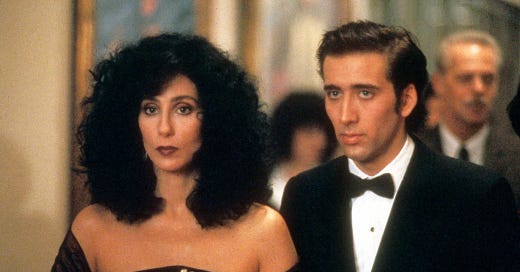



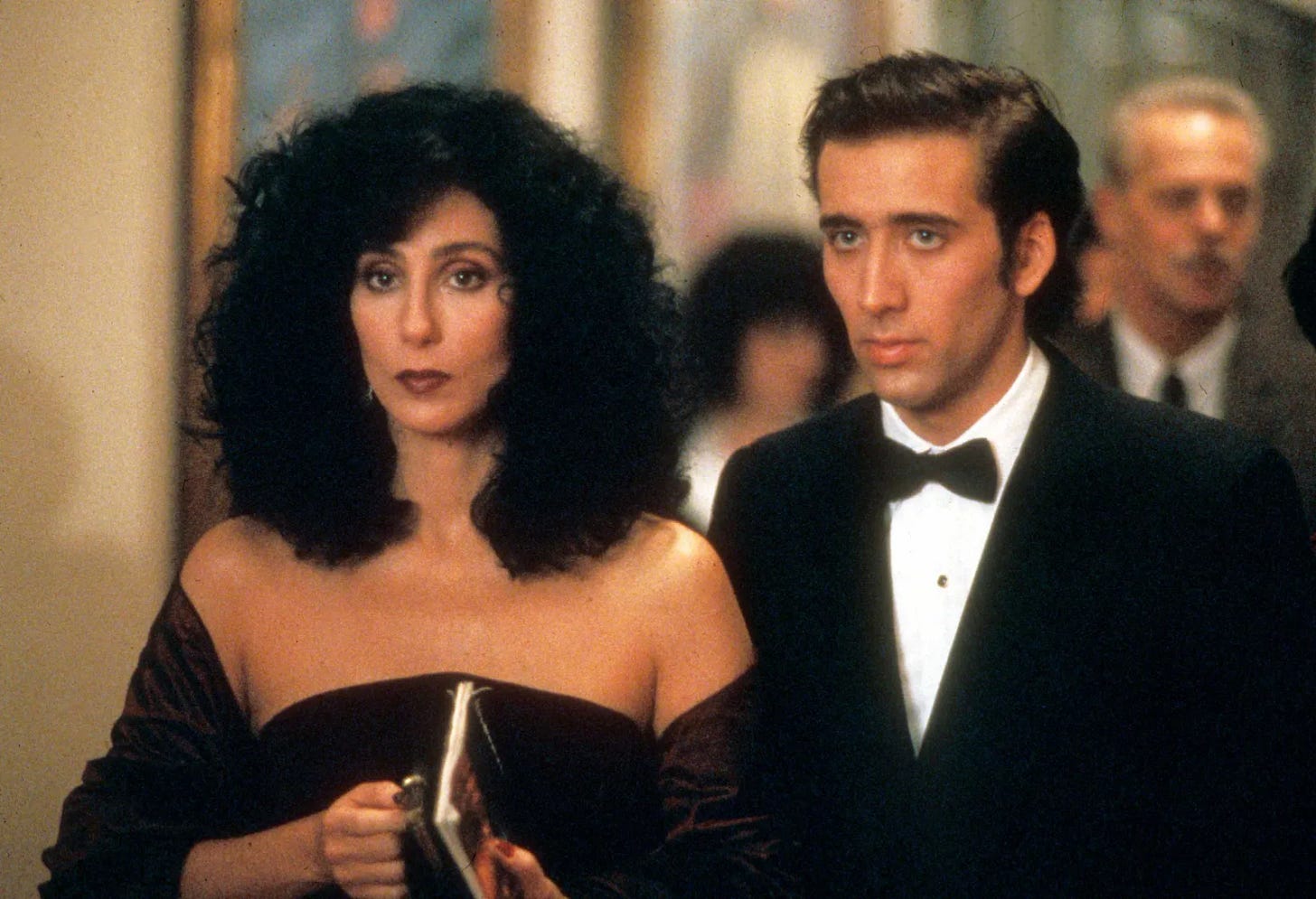

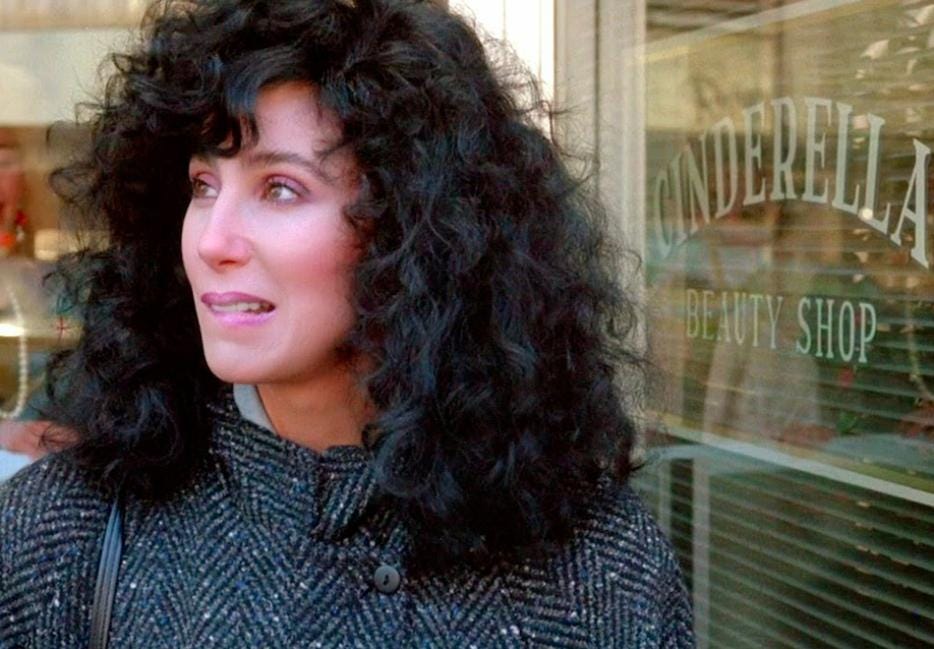
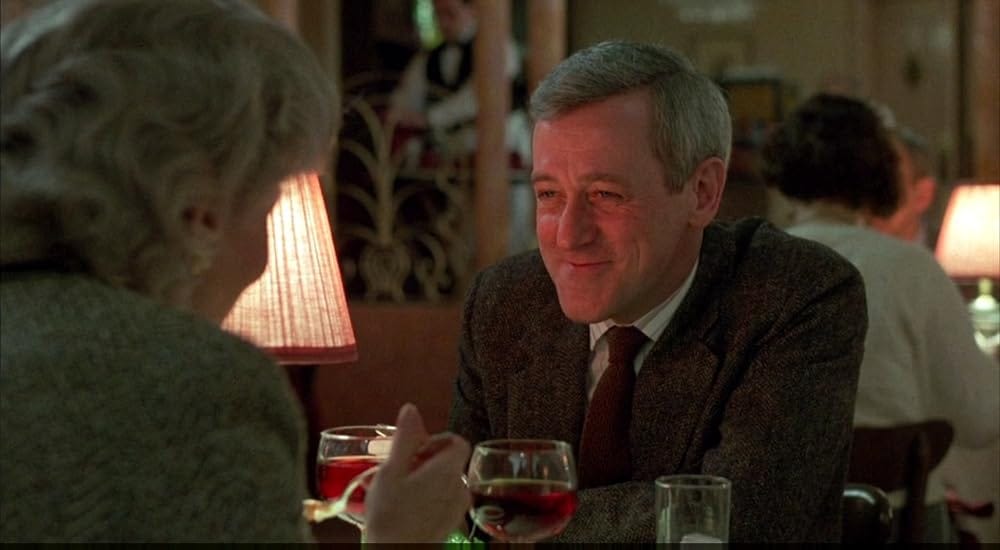
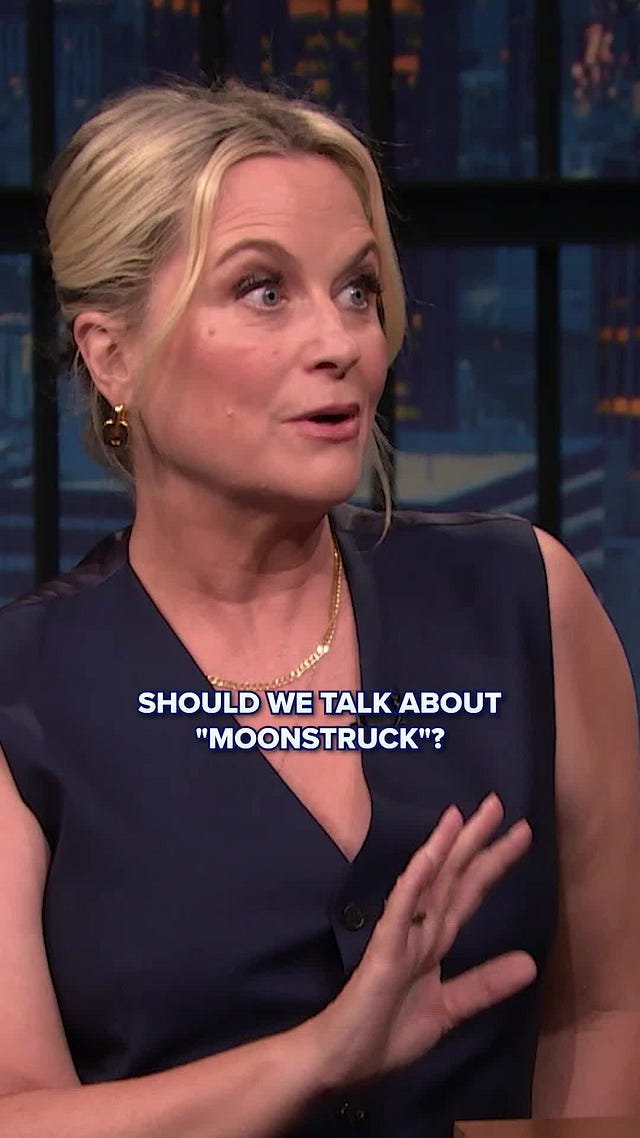
For me Moonstruck is a perfect representation of the over-the-top 80s and one of my favorite rom-coms. You can't just have a moon, it has to be an enormous moon that's impossible to ignore. You have to have an old man with a million dogs, not just one. A leading man who's lost his hand. Same year as Lethal Weapon and Fatal Attraction. Even the names of movies are completely over the top!
You're right that the character actors, especially the older ones, pretty much steal the show from the stars and they are so delicious to watch. Yes, have to agree that Olympia Dukakis alone is worth the price of admission. Having Italian-American friends at that time who were quite dramatic in the way they spoke and behaved, the characters even with their overacting didn't go too far for me.
I also love Mermaids, and tend to enjoy watching Cher on TV and in movies and on talk shows. She's one of a kind. Enjoy watching Winona Ryder as well (fan of Stranger Things here).
Well, I'm late to the show here but I think this is maybe not the greatest movie of all time but the best written movie of all time, which puts in on the short list of greatest.
Did you know the story of its first, failed test screening? They had a test screening in NJ and then another the next night in NY. First one went not so great. Second one everybody loved it. They changed one thing between them. The intro song.
Originally the opening credits were over some torrid aria from La Boheme. It set the stage poorly. The audience didn't know how to react.
Then they changed it to Dean Martin's "That's Amore". Saying to the audience "It's a comedy, people. Laugh!" Worked like a charm.
(I am remembering this from an interview I heard with someone who worked on the movie. So take that for whatever you want to take it for but it makes sense to me.)